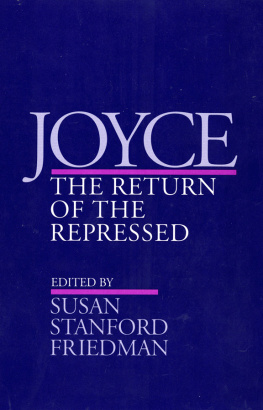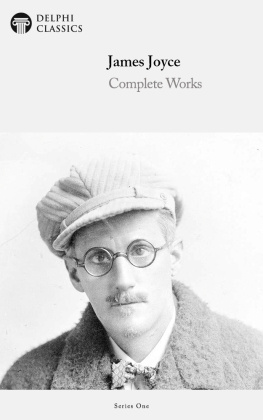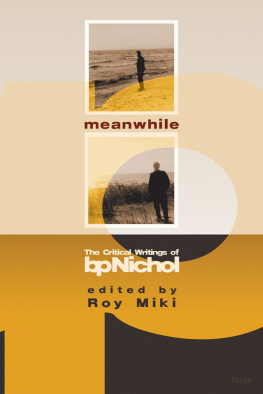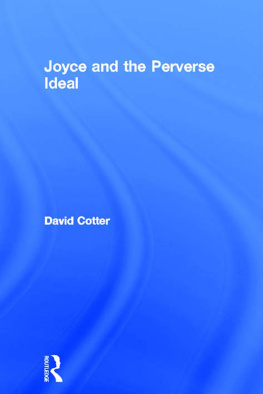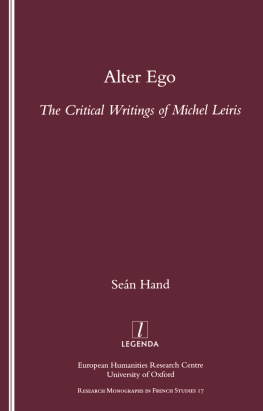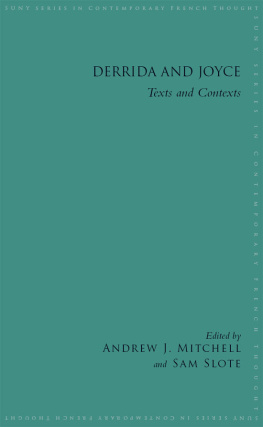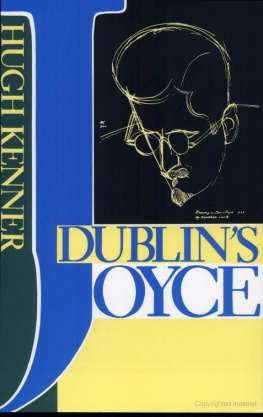Joyce - Critical Writings
Here you can read online Joyce - Critical Writings full text of the book (entire story) in english for free. Download pdf and epub, get meaning, cover and reviews about this ebook. City: Mineola;New York, year: 2018, publisher: Dover Publications, genre: Science. Description of the work, (preface) as well as reviews are available. Best literature library LitArk.com created for fans of good reading and offers a wide selection of genres:
Romance novel
Science fiction
Adventure
Detective
Science
History
Home and family
Prose
Art
Politics
Computer
Non-fiction
Religion
Business
Children
Humor
Choose a favorite category and find really read worthwhile books. Enjoy immersion in the world of imagination, feel the emotions of the characters or learn something new for yourself, make an fascinating discovery.

Critical Writings: summary, description and annotation
We offer to read an annotation, description, summary or preface (depends on what the author of the book "Critical Writings" wrote himself). If you haven't found the necessary information about the book — write in the comments, we will try to find it.
Critical Writings — read online for free the complete book (whole text) full work
Below is the text of the book, divided by pages. System saving the place of the last page read, allows you to conveniently read the book "Critical Writings" online for free, without having to search again every time where you left off. Put a bookmark, and you can go to the page where you finished reading at any time.
Font size:
Interval:
Bookmark:
CRITICAL WRITINGS

James Joyce
DOVER PUBLICATIONS, INC.
MINEOLA, NEW YORK
DOVER THRIFT EDITIONS
GENERAL EDITOR: SUSAN L. RATTINER
EDITOR OF THIS VOLUME: JANET B. KOPITO
Copyright
Copyright 2018 by Dover Publications, Inc.
All rights reserved.
Bibliographical Note
This Dover edition, first published in 2018, is a new compilation of essays, letters, and reviews by James Joyce, reprinted from authoritative sources. Because some of the works in this collection are of a fragmentary nature and were not given titles by James Joyce, each work in question will appear as [Untitled Fragment]. A Note has been specially prepared for this edition.
International Standard Book Number
ISBN-13: 978-0-486-82436-9
ISBN-10: 0-486-82436-5
Manufactured in the United States by LSC Communications
82436501 2018
www.doverpublications.com
Note
JAMES JOYCE (BORN in Dublin, 1882; died in Zurich, 1941), is generally thought to be the most dazzling prose stylist of the twentieth century. His major works include the short story collection Dubliners (1914), the novel A Portrait of the Artist as a Young Man (1916), and the experimental, groundbreaking longer works Ulysses (1922) and Finnegans Wake (1939), as well as two early volumes of verseChamber Music (1907) and Pomes Penyeach (1927). A contemporary of the Irish Renaissancea literary revival marked by cultural and political expression in theater, prose, and poetry that included William Butler Yeats, Lady Isabella Gregory, John Millington Synge, Sean OCasey, and Padraic ColumJames Joyce set out to discover the meaning of his nationality through his art. He both celebrates and ridicules the historical voyage of Ireland, revealing deep love as well as impatience. His achievement lies largely in his uncanny ability to fuse the intimacy of an individual characters private reflections and inner torments with the larger narrative of human history.
In addition to his well-known prose works, James Joyce was a prolific writer of essays and various forms of commentary, including book and theater reviews. This compilation ranges from a consideration of the great Norwegian dramatist Henrik Ibsen (Ibsens New Drama) to fragmentary pieces on the nature of tragedy in art (to the Burmese people; in Unequal Verse, he assails a book of poetry as a farrago of banal epics; and in The Centenary of Charles Dickens, Joyce reviews the strengths of the Victorian author while noting how he falls short when compared to the stern realism and ultra-modern tendency of the towering figures of Tolstoy and Zola.
Any reader interested in rounding out an appreciation of the keen literary sensibility, sharp wit, and honesty of James Joyce will benefit from the diverse and entertaining thoughts and impressions that Joyce reveals in the three dozen pieces in this collection.
Contents
CRITICAL WRITINGS
TRUST NOT APPEARANCES
AMDG
THERE IS NOTHING so deceptive and for [all] that so alluring as a good surface. The sea, when beheld in the warm sunlight of a summers day; the sky, blue in the faint and amber glimmer of an Autumn sun, are pleasing to the eye: but, how different the scene, when the wild anger of the elements has waked again the discord of Confusion, how different the ocean, choking with froth & foam, to the calm, placid sea, that glanced and rippled merrily in the sun. But the best examples of the fickleness of appearances are:Man and Fortune. The cringing, servile look; the high and haughty mien alike conceal the worthlessness of the character. Fortune that glittering bauble, whose brilliant shimmer has allured and trifled with both proud and poor, is as wavering as the wind. Still however, there is a something that tells us the character of man. It is the eye. The only traitor that even the sternest will of a fiendish villian [sic] cannot overcome. It is the eye that reveals to man the guilt or innocence, the vices or the virtues of the soul. This is the only exception to the proverb Trust not appearances. In every other case the real worth has to be searched for. The garb of royalty or of democracy are but the shadow that a man leaves behind him. Oh! how unhappy is that poor man that hangs on princes favours. The fickle tide of ever-changing Fortune brings with itgood and evil. How beautiful it seems as the harbinger of good and how cruel as the messenger of ill! The man who waits on the temper of a King is but a tiny craft in that great ocean. Thus we see the hollowness of appearances. The hypocrite is the worst kind of villian [sic] yet under the appearance of virtue he conceals the worst of vices. The friend, who is but the fane of fortune, fawns and grovells [sic] at the feet of wealth. But the man, who has no ambition, no wealth, no luxury save Contentment cannot hide the joy of happiness that flows from a clear conscience & an easy mind.
LDS.
James A. Joyce
[UNTITLED FRAGMENT]
BOTH QUESTIONS OF moment and difficult to answer. And although it is, in the main, evident that the conquest gained in a righteous war, is itself righteous, yet it will not be necessary to digress into the regions of political economy, etc, but it will be as well to bear in mind, that all subjugation by force, if carried out and prosecuted by force is only so far successful in breaking mens [sic] spirits and aspirations. Also that it is, in the extreme, productive of ill-will and rebellion, that it is, again, from its beginning in unholy war, stamped with the stamp of ultimate conflict. But indeed it seems barbaric to only consider subjugation, in the light of an oppressing force, since we shall see that more often is it an influence rather than a positive power, and find it better used than for the vain shedding of blood.
In the various grades of life there are many homely illustrations of its practicenone the truer, that they are without blaze or notoriety, and in the humblest places. The tiller who guides the plough through the ground, and breaks the stubborn glebe is one. The gardener who prunes the wayward vine or compels the wild hedge into decent level, subjugating the savage element in trim gardens, is another. Both of these represent subjugation by force; but the sailors method is more diplomatic. He has no plough to furrow the resisting wind, nor no knife to check the rude violence of storm. He cannot, with his partial skill, get the better of its unruliness. When olus has pronounced his fiat, there is no direct countermanding his order. That way the sailor cannot overcome him; but by veering, and patient trial, sometimes using the strength of the Wind, sometimes avoiding it, now advancing and now retreating, at last the shifting sails are set for a straight course, and amid the succeeding calm the vessel steers for port. The millers wheel which although it restrains the stream yet allows it to proceed on its own way, when it has performed the required service, is an useful example. The water rushing in swift stream, is on the higher mountains a fierce power both to excite emotion and to flood the fields. But the magic miller changes its humour, and it proceeds on its course, with all its tangled locks in orderly crease, and laps its waves, in placid resignation, on the banks that slope soberly down from suburban villas. And more, its strength has been utilised for commercial ends, and it helps to feed, with fine flour and bread, no longer the poetical but the hungry.
After these subjugations of the elements, we come to the subjugation of animals. Long ago in Eden responsible Adam had a good time. The birds of the air and the beasts of the field, ministered to his comfort. At his feet slept the docile lion, and every animal was his willing servant. But when sin arose in Adambefore only a latent eviland his great nature was corrupted and broken, there were stirred up also among beasts the unknown dregs of ferocity. A similar revolt took place among them against man, and they were no longer to be friendly servants but bitter foes to him. From that hour, in greater or less degree, more in one land than another, they have struggled against him and refused him service. Aided often by great strength they fought successfully. But at length by superior power, and because he was man and they were but brutes, they, at least to a great extent, were overcome. Some of them, as the dog, he made the guardians of his house; others, as the horses and oxen, the helpmates of his toils. Others again he could not conquer but merely guard against, but one race in particular threatened by its number and power, to conquer him; and here it may be as well to follow the fate of it and see how a superior power intervened to preserve for man his title, not in derision, of lord of the creation and to keep him safe from the fear of mammoth and of mastodon. The Zoo elephants are sorry descendants of those mighty monsters who once traversed the sites of smoky cities; who roamed in hordes, tameless and fearless, proud in their power, through fruitful regions and forests, where now are the signs of busy men and the monuments of their skill and toil; who spread themselves over whole continents and carried their terror to the north and south, bidding defiance to man that he could not subjugate them; and finally in the wane of their day, though they knew it not, trooped up to the higher regions of the Pole, to the doom that was decreed for them. There what man could not subdue, was subdued, for they could not withstand the awful changes that came upon the earth. Lands of bright bloom, by degrees, lost all beauty and promise. Luxuriance of trees and fulness of fruit gradually departed, and were not, and stunted growth of shrub and shrivelled berries that no suns would ripen, were found in their room. The tribes of the Mammoth were huddled together, in strange wonder, and this devastation huddled them still closer. From oases, yet left them, they peered at the advancing waves, that locked them in their barren homes. Amid the gradual ice and waters, they eked out the days of the life of their vanity and when nothing remained for them but death, the wretched animals died in the unkind cold of enduring winter, and to-day their colossal tusks and ivory bones, are piled in memorial mounds, on the New Siberian Islands. This is all of them that is left, that man may have good by their death, whom he was not able to make his slaves when they lived, to tempt his greed across the perilous, Polar seas, to those feasts of the wealth of bygone times, that are strewn and bleaching beneath the desolate sky, white and silent through the song of the changeless waves, and on the verge of the eternal fathoms. What a subjugation has this beenhow awful and how complete! Scarce the remembrance of the mammoth remains and no more is there the fear of the great woolly elephant but contempt of his bulk and advantage of his unweildiness [
Next pageFont size:
Interval:
Bookmark:
Similar books «Critical Writings»
Look at similar books to Critical Writings. We have selected literature similar in name and meaning in the hope of providing readers with more options to find new, interesting, not yet read works.
Discussion, reviews of the book Critical Writings and just readers' own opinions. Leave your comments, write what you think about the work, its meaning or the main characters. Specify what exactly you liked and what you didn't like, and why you think so.









